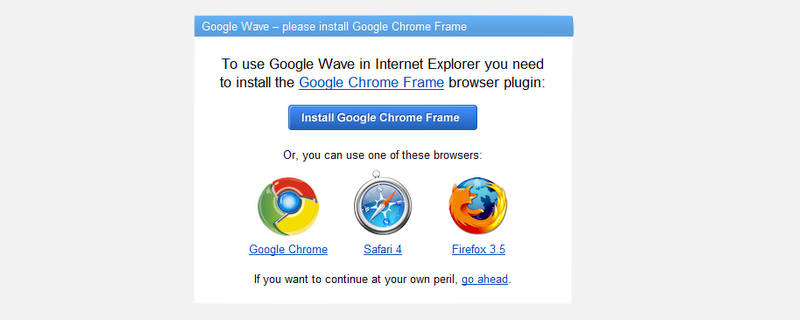Google sneaks WebKit HTML 5 support into Internet Explorer
A report by Gregg Keizer in Computerworld said that installing Google's plugin resulted in an average speed improvement that was 9.6 times faster than IE 8 alone, based on SunSpider JavaScript benchmarks.
Google recommends the new IE plugin, called Chrome Frame, to any users who aren't able to install an alternative browser. With the plugin installed, IE's own Trident rendering engine continues to render web pages until it either encounters HTML 5 or is manually prompted by the user to render like the native Chrome browser.
In addition to being much faster at executing JavaScript, Chrome Frame's WebKit rendering engine also provides IE with support for new HTML 5 features, which are required to run an emerging crop of advanced web applications. WebKit also powers Apple's Safari browser and the mobile version of Safari used on the iPhone and iPod touch.
One example of an advanced HTML 5 web app is Google Wave, a collaboration toolkit for building dynamic browser apps that enable rich communication features between users. Google Wave invites IE users to download the Chrome Frame plugin, or alternatively download a browser than can render HTML 5 natively, including the full version of Chrome, Safari 4, or Firefox 4.
Google has worked closely with Apple, Mozilla, and Opera to flesh out HTML 5 as a detailed specification that any browser developer can use to build support for rich Internet apps based on web standards that don't require additional middleware such as Adobe Flash or Microsoft's Silverlight.
Google recently commended Microsoft for initiating constructive participation in the HTML standard, but clearly wants to widen adoption of HTML 5 as rapidly as possible. By offering a plugin for IE, Google can deliver its own HTML 5 support within the browser right now.
In a Google blog posting, Wave developers explained, "Google Wave depends on strong JS and DOM rendering performance to provide a desktop-like experience in the browser. HTML5's offline storage and web workers will enable us to add great features without having to compromise on performance. Unfortunately, Internet Explorer, still used by the majority of the Web's users, has not kept up with such fairly recent developments in Web technology. Compared with other browsers, the JavaScript performance is many times slower and HTML5 support is still far behind. Likewise, the many different versions of IE still in use — each with its own set of CSS quirks and layout limitations — further complicates building rich Web applications.
"In the past, the Google Wave team has spent countless hours solely on improving the experience of running Google Wave in Internet Explorer. We could continue in this fashion, but using Google Chrome Frame instead lets us invest all that engineering time in more features for all our users, without leaving Internet Explorer users behind."
IE 8 families at risk
Microsoft responded to the release of Chrome Frame by claiming that Google's new plugin makes IE 8 less secure. In a comment made to Ars Technica, Microsoft said that installing the plugin "is not a risk we would recommend our friends and families take."
Despite a variety of Microsoft-sponsored research that has recently declared IE 8 the most secure browser (exclusively in terms flagging suspect URLs a user decides to visit), most IE users are still using IE 6, followed by IE 7, both of which are know to expose users to more serious security issues that any modern competitors. That means most IE users will enhance their relative security by either installing the Chrome Frame plugin or downloading Chrome 3, Safari 4, or Firefox 4 to use instead.
Users of IE 8 will have to weigh the value of Microsoft's security mechanisms designed to protect them from (mostly) overt phishing attacks or (the rare) vulnerability exploits in the wild against the benefits of HTML 5 and Google's 10 times faster JavaScript performance.
Additionally, since HTML 5 is designed to replace Flash and Silverlight, any studies recommending a web browser solely on the basis of security will need to factor in all of the security vulnerabilities in Flash and Silverlight against using a browser that does not need them to render rich web applications. The reports Microsoft cites in favor of IE 8 do not.
 Prince McLean
Prince McLean











 Marko Zivkovic
Marko Zivkovic
 Amber Neely
Amber Neely
 Christine McKee
Christine McKee
 Malcolm Owen
Malcolm Owen
 Mike Wuerthele and Malcolm Owen
Mike Wuerthele and Malcolm Owen

 William Gallagher
William Gallagher








